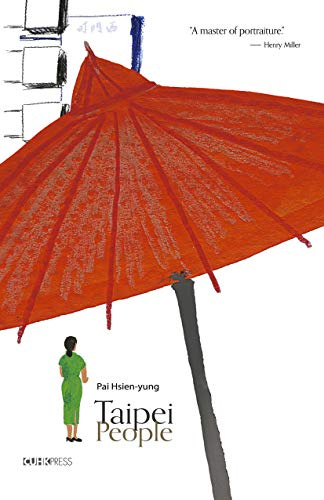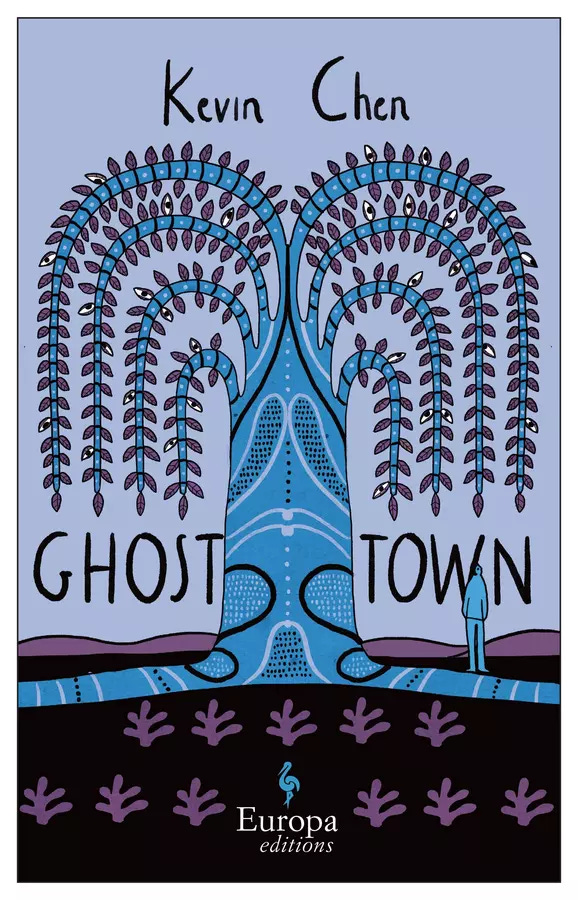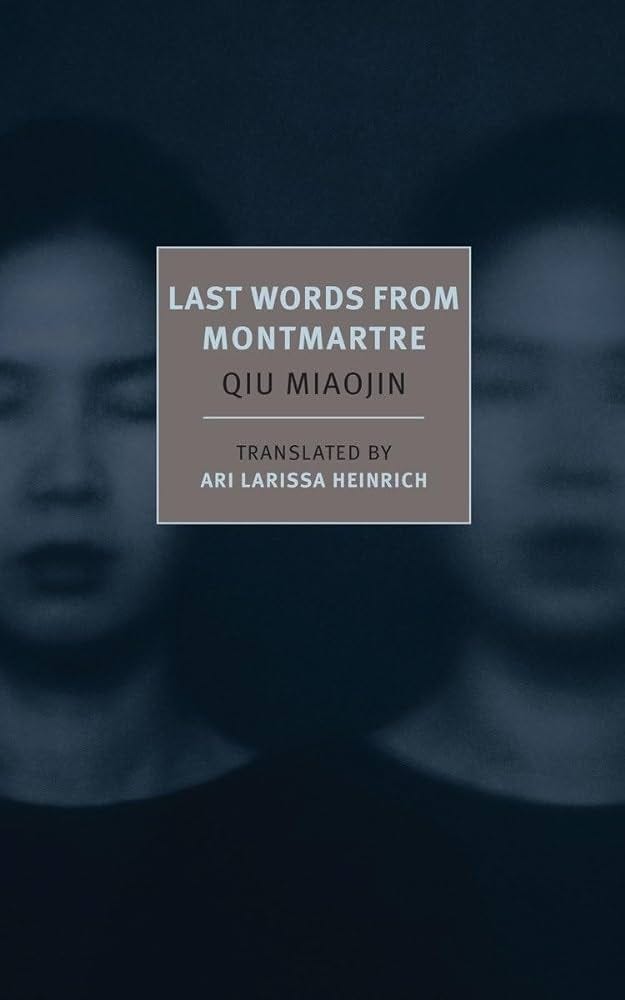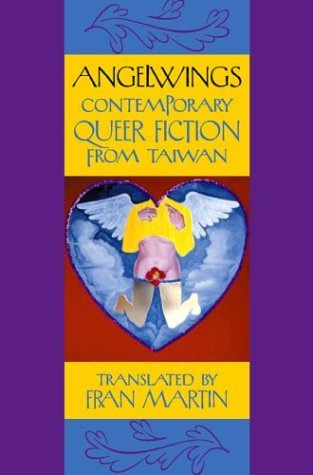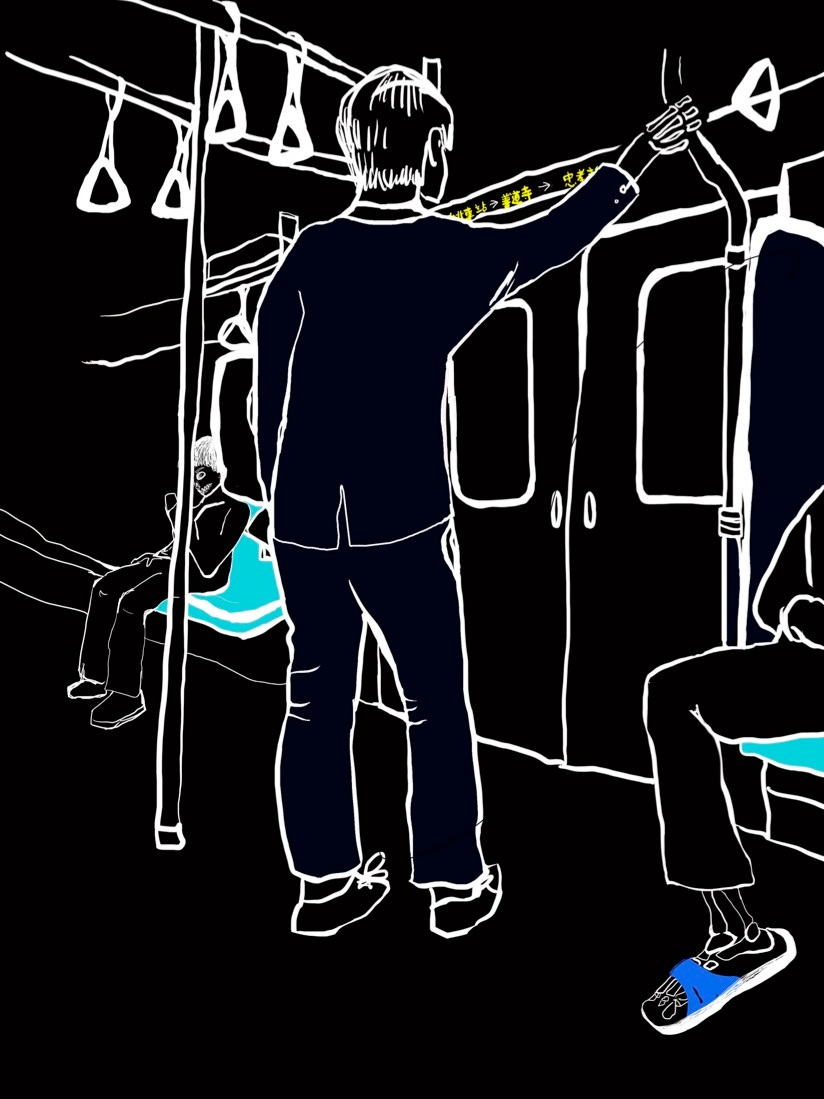Living Fearlessly
Acclaimed author Chi Ta-wei opens up about the unique, decades-long journey of queer literature in Taiwan.
Last week, Taiwanese drag star Nymphia Wind became the toast of the nation after being crowned queen on the US reality show RuPaul’s Drag Race and winning praise from President Tsai Ing-wen, who tweeted out: “Taiwan thanks you for living fearlessly.”
It was a colorful reminder of how far Taiwan has come in advancing the rights of its LGBTQ+ citizens. As the first nation in Asia to legalize same-sex marriage and home of the region’s biggest Pride Parade, it has become a beacon for many in recent years. But it’s also a story that goes much further back, and to much darker times.
More so than any other medium, Taiwan’s tradition of queer literature offers perspectives that stretch over decades — and when it comes to the development of queer literature in the Chinese language, it is an understatement to say that author, scholar, and translator Chi Ta-wei (紀大偉) has long been ahead of the curve.
For much of his life, ever since he first achieved popular and critical acclaim for Membranes (膜) — a masterful work of queer speculative fiction set in an undersea dome world where humanity has sought refuge from devastating climate change — Chi Ta-wei has actively advanced both the genre and its study.
In the 1990s, a young writer experimenting with the possibilities of fiction through works like Membranes and Fetishism (戀物癖), Chi was central to a blossoming movement of queer literature in Taiwan that included writers like Qiu Miaojin (邱妙津), Chen Xue (陳雪), and Chu T’ien-wen (朱天文). More than twenty years later, Chi Ta-wei’s monograph A History of Tongzhi Literature: An Invention of Taiwan (同志文學史: 台灣的發明), which traced the history of LGBTQ literature in Taiwan from the 1950s through to the post-Cold War era, was published just months before Taiwan’s Constitutional Court ruled that the country’s marriage law was unconstitutional and that same-sex couples have a constitutional right to marry.
In the second installment of our Lingua Sinica series on Chinese-language publishing, CMP’s Dalia Parete sat down with Chi Ta-wei, who is currently an associate professor of Taiwanese literature at National Chengchi University in Taipei, to discuss his journey as a writer, scholar, and translator. Following this interview, you’ll also find a list of Chi’s top five book recommendations for queer literature in Taiwan.
Lingua Sinica: Thank you, Chi Ta-wei, for taking the time to speak to us. Perhaps you could begin by telling us how you first started writing fiction in the 1990s, and what your inspirations were.
Chi Ta-wei: As a young graduate student, I supported myself by tutoring primary and middle school students, a common practice in many countries. However, I grew weary of it and decided to try my hand at fiction writing, hoping to make a living. I was fortunate to find inspiration along the way.
In the 90s, Taiwanese and Chinese people believed they needed to learn from the States, Europe, and Japan. This perspective influenced my decision to major in English and study the Western canon, including Shakespeare, as well as alternative canons like Pasolini. I also followed arthouse film directors like Fellini, who balanced alternative and mainstream styles.
My fascination with European culture, particularly Italian arthouse films, stems from my youth. I watched many such films in high school and college, which naturally found their way into my fiction. My novel, therefore, is a blend of various influences: my European obsession, my desire to live openly as a gay man, and my immersion in American and European literature.
My goal was to prepare myself for a fulfilling life abroad, believing that I could only be a happy gay man in the States or Europe.
It may seem that my book caters to American, British, and European readers, but this is merely a coincidence. In the 90s, I wrote with the Taiwanese audience in mind, aiming to impress the local jury with cultural references to Europe.
In the 1990s, I never expected European readers to engage with my work. My goal was to prepare myself for a fulfilling life abroad, believing that I could only be a happy gay man in the States or Europe. This naive approach resulted in a novel that resonates with an international audience, a fortunate outcome I did not anticipate.
LS: How did the literary and artistic culture of the 1990s in Taiwan influence the experiences of queer people?
CTW: The 1990s was a fascinating period, but it's crucial not to idealize it. We can acknowledge that there were protective bubbles for those who sought alternative cultures during that time. By "alternative," I refer to the ability to enjoy queer life and non-normative experiences in Taiwan, provided you traveled frequently, used foreign languages, dated foreigners, and were involved in the arts, which were not widely understood by many. Living within these bubbles allowed people to find happiness and satisfaction.
For queer individuals of my generation in the 1990s, exploring queer possibilities was better achieved by majoring in English or French. However, this trend has shifted, as queer people no longer need to confine themselves to the high arts bubbles. They can now discover new, inclusive spaces in Taiwanese society.
The 1990s was a fascinating period, but it's crucial not to idealize it.
When discussing the limitations and liberations of spaces, it's clear that we in the 1990s heavily relied on these bubbles. Italo Calvino's works gained significant attention in Taiwan during that time, primarily through the Taiwanese people’s habitual dependence on English translations. However, in the 2020s, most of Calvino's books have been newly translated directly from Italian to Chinese. Ironically, Taiwanese readers seem to have lost interest in him, as the need for high arts bubbles has diminished. During the 1990s, it was common for gay and lesbian individuals to socialize and date by inviting each other to discuss European literature. This was a prevalent practice in the alternative, high arts scene of the time.
LS: I know you’ve said in the past that after returning to Taiwan from the US, you came to appreciate that queer literature in Taiwan had a character all its own. If I’m not mistaken, you once called it a “creolized tradition.” Could you talk just a bit about Taiwan’s tradition of queer literature and what makes it unique?
CTW: Before I left Taiwan for the US to do PhD degree, I presumed — like many people in Taiwan — that our tradition of queer Taiwanese literature was modeled after the tradition of queer American literature, queer Japanese literature, or queer British literature. In Taiwan, like in many smaller countries, we tend to presume that our knowledge of anything must be learned from stronger countries — often ex-colonizers — rather than developed locally.
But during my many years in the US, after interactions with scholars of US, UK, and Japanese literature, I finally realized that they did not have their own traditions of queer literature — or, at least, they did not exist in a fashion Taiwanese readers would imagine. True, the UK had Oscar Wilde and he has been influential in Taiwan. But not every decade in the modern UK is characterized by queer writers like Wilde, or queer works like his. By contrast, from the 1960s to the present day, every decade in modern Taiwan is characterized by queer writers and queer texts. While the tradition in question in Taiwan is compact and condensed, that in the UK is not. This is also the case with the US and Japan.
I have to clarify that the Taiwanese tradition, or “invention,” does not mean make it superior to other countries. Instead, I mean to point out the contrast: whereas Taiwanese people have spent decades establishing a tradition of queer literature uninterrupted, other countries have had other options. Pride parades have been legal and popular in the US and UK for decades, but not in Taiwan until the 1990s. Underground queer films were available in the US, UK, and Japan during the Cold War but not in Taiwan. Despite widespread homophobia in Japan, Tokyo has been known for its vibrant gay nightlife for decades. In Taiwan, gay bars were illegal until the 1990s.
Literature has been a haven for Taiwan’s dissidents.
In other words, queer people and their allies in the US, UK, and Japan could choose to busy themselves with other activities like filmmaking, parades, demonstrations, drag shows, and so forth during the Cold War era — but those in Taiwan had to stick to literature throughout the Martial Law period (1947-1987). Literature has been a haven for Taiwan’s dissidents.
LS: Do you believe that Membrane and other works published in the same era played a role in paving the way for queer literature in Taiwan? Did you sense a shift in the publishing landscape for queer books following your book and the works of other major authors?
CTW: Interestingly, my own work and that of Qiu Miaojin (邱妙津) share a common thread, as we both incorporate extensive cultural references to Europe and Japan in our novels. This connection can be traced back to our shared experiences attending underground cinema clubs in the 80s and 90s, where we had access to pirated European films. Although we didn't know each other at the time, the discovery of our similar backgrounds through our writing has led me to consider the potential impact of our books on Taiwanese literature.
It is a coincidence that both Qiu Miaojin’s last novel and my Membranes were both translated by Ari Heinrich into English. A fellow of the Australian Academy of the Humanities, Heirnich used to hang out with indie rock singers in Taipei in the 1990s. He chose to translate Qiu’s and my novel and recommend them to elite publishers in the US — for he finds Qiu’s and my books remind him of his wonderful memory of the chaotic Taipei in the 1990s.
It took several years for Ari and me to realize that all of us, Ari, Qiu, and I, shared similar but alternative interests in the 1990s in Taipei, but none of us knew each other in person back then.
It's important to understand that our works build upon the foundation laid by our predecessors.
However, it's important to understand that our works build upon the foundation laid by our predecessors. For instance, Qiu Miaojin, was strongly influenced by the French writer André Gide's book, which was translated in the 90s. She was also influenced by Yukio Mishima, a Japanese writer with a complex legacy. In Japan, Mishima is often viewed as a fascist writer, but in Taiwan, his work is interpreted through a homoerotic lens, devoid of political connotations. Mishima's popularity during the Cold War, when his novels were translated and widely read, further underscores the existence of queer literature before our time. Therefore, while our works may represent a new phase in Taiwanese literature, they are not entirely without precedent, as they are informed by the contributions of many pioneering authors who came before us.

LS: Let's talk about the editorial space in Taiwan. Many first-time authors struggle to get their books published, but this wasn’t the case for you with Membrane. How did that happen?
CTW: My novel Membrane won a significant literary prize from the United Daily News Group (聯合報系) in Taiwan during the 1990s, which guaranteed its publication by a major Taipei publisher, Linking Publishing (聯經出版), which was a company inside the UDN group. The possibility of publication was a significant draw for me when I entered the competition. Linking Publishing remains popular today due to their substantial investment also in their online platform compared to other publishing companies. I consider it a fortunate coincidence that my book was published by them.
LS: How was it received by the Taiwanese readers?
CTW: There has been some mention of my work, with certain readers expressing their fondness for it. Taiwanese readers, in particular, tend to appreciate writers who share their personal stories. If I were to write an autobiography, I believe some readers would enjoy it, even if I can't predict the exact number.
This preference for personal narratives is reflected in the popularity of semi-autobiographical novels in Taiwan and other East Asian countries. Such works often resonate with readers and are well-received. Scholars and graduate students occasionally engage in academic discussions about my novel and other stories, making it relatively easy to find scholarly analyses of my work. However, I can't help but wonder if local readers embrace the book as enthusiastically as international readers do.
LS: I'm curious if you faced any challenges publishing your other works, like Breakfast (早餐) or others?
CTW: Interestingly, that short story also won a major prize from the UDN Group. Due to the win, the story was published as a matter of right and obligation. The judges supported the story, interpreting it as a resonant tale of a married couple, assuming it was about a heterosexual couple. This illustrates how societal attitudes have evolved, as the story's subtlety, which was taken for granted in the 1990s, might not be as well-received today due to the increased visibility of queer people in Taiwan.
LS: Your novella skillfully integrates various cultural references, ranging from Pasolini and Almodovar to Japanese myths and Robert Altman. How do you think this rich cultural tapestry has contributed to the book's translation into numerous languages, with Spanish being the latest?
CTW: It's quite a fascinating coincidence that Spanish readers have expressed delight in finding Almadovar in my novel, as I didn't consciously include him while writing. During my book tours in various European countries, I've had the pleasure of meeting readers and reviewers who appreciate my affinity for European cultures. For instance, in Italy, Italian readers have been particularly thrilled to learn about my interest in Pasolini's exhibitions, as many Taiwanese writers are unfamiliar with his work.
This coincidence has led me to ponder the possible interpretations of my novel and my persona in the 1990s. One might ask, "Why is the Taiwanese writer so distorted? Why is he so detached from his native land? And why does he imagine himself as European?" While it can be seen as a cheerful aspect of my writing, it also carries a hint of melancholy. When I feel so connected to Europe and receive such a warm reception from European readers, I can't help but feel like a misfit in my home country.
I can't help but feel like a misfit in my home country.
The contrast between the enthusiasm of international readers and the more reserved response from local readers is quite intriguing. Local readers, who are less familiar with the cultural context, might find the book too foreign or distant from their own experiences. On the other hand, international readers, who are encountering the story from a different cultural perspective, might find it refreshing and engaging. Overall, the coincidental inclusion of European elements in my novel has led to a rich exploration of my own identity and the relationship between my writing and the cultural contexts in which it is received.
LS: Would you ever consider your novella a political satire?
CTW: I must admit, the novel presents a unique challenge: despite being written in Chinese, it may feel distant from Taiwanese culture. The story rarely mentions Chinese spaces, names, or people, and Taiwanese characters or settings are equally vague. This choice stems from my personal uncertainty during the 90s, a time of diverse political discourses.
In the 90s, Taiwanese society was more pluralistic, with various political voices, unlike the current polarized climate where people are either pro-Beijing or anti-Beijing. However, I wasn't confident enough to engage directly with politics in my writing. Before the 90s, Taiwanese writers rarely celebrated their homeland's beauty, but after the 90s, this became common. I found myself in a transitional period, unsure of how to express my Taiwanese and sexual identities. As a result, I downplayed national identity in the novel.
The novel may appear apolitical, but acknowledging politics indirectly is a political act in itself.
The novel may appear apolitical, but acknowledging politics indirectly is a political act in itself. Looking back, I regret not providing a realistic or fantastical portrayal of Taiwan or Taipei, as readers might struggle to find any depiction of the city in the book. If I were to write something new, I would eagerly offer a picture of Taipei, exploring the city through the lens of science fiction.
LS: I know that you have experience as a translator. In fact you have translated some books of Italian author Italo Calvino. How was the experience of being a translator opposed to being a writer?
CTW: As a young person, before the advent of the Internet and Wikipedia, I found myself drawn to American and European cultures. To foster this connection, I engaged in various activities, including translating European and American literature into Chinese. This process allowed me to immerse myself in the cultures I admired, even though it came with financial challenges.
In many countries, including Taiwan, translators are not typically well-compensated. Despite the limited financial rewards, I found immense moral support in the translation process. I felt a strong connection to Italy as I translated its literature. This phase of my life, while flawed, was an essential part of my journey towards understanding and appreciating the cultures that captivated me.
LS: In recent times, there has been a noticeable increase in the popularity of queer publishing, with Boy Love (BL) novels becoming more readily available both online and in physical bookstores. As an expert in the field, I’m interested in your thoughts on how this growing interest in queer publishing might impact the opportunities for queer literature to be published and the visibility of queer voices in Taiwanese literature.
CTW: When embarking on my book tour in Italy, Milan was my first destination. As I was going from the airport to the city center, I couldn't help but notice the number of bookstores lining the streets of Milan. Initially captivated by the ubiquitous presence of bookshops, I found myself feeling somewhat overwhelmed by the prevalence of BL publications such as Heartstopper. I can say it is a common sight across various European countries.
During my time in Milan, I had the pleasure of meeting my Italian translator Alessandra Pezz, who turned out to be a keen supporter of BL cultural products. While I appreciated our friendship, I couldn't help but reflect on the complex relationship between those involved in publishing queer literature and those immersed in producing BL content. Despite the theoretical compatibility between the two genres, the practical reality reveals a competitive dynamic driven by market forces.

The dichotomy between readership preferences for manga and literary works further complicates this landscape. While some gravitate towards the depth of serious literature, others are drawn to the allure of popular manga, creating a divide that challenges the coexistence of these distinct works of fiction.
As a more experienced writer, I acknowledge the nuances of this competition, understanding the implications it may have for emerging artists navigating their creative paths.
For young individuals exploring their artistic pursuits, particularly within the LGBTQ+ community, the decision between creating BL manga or pursuing literary endeavors poses a significant dilemma. The influence of market demands and financial considerations adds layers of complexity to this decision-making process, underscoring the challenges faced by aspiring artists seeking to find their place within these divergent spheres.
Reflecting on my own research journey from queer literature to BL culture, I encountered differing perceptions within academic circles, particularly in Taiwan. While the academic landscape in Taiwan allows for a broad range of research topics, there exists a subtle bias that distinguishes between subjects deemed "serious" and those perceived as more niche or highly commercialized, such as BL culture.
In the realm of academia, the delineation between literature scholars and researchers focusing on BL culture highlights broader societal attitudes towards these distinct fields of study. On the one hand, there are the more traditional scholars focused on literature, and on the other there are the more trendy scholars focused on popular culture in general and on BL culture in particular. The tension between academic pursuits and popular culture underscores the need for a nuanced approach to integrating diverse cultural elements into educational settings, ensuring a balanced and inclusive learning environment that resonates with students' interests and fosters intellectual engagement.
LS: I want to come back to something you said earlier about Taiwanese appreciating authors who tell their personal stories. Do you have any plans in the works to write an autobiography?
CTW: I did not want to when I was in the 1990s. I do not want to now in the 2020s. And I hope I will not when I retire. My simple reason is that I want to be reasonably mysterious to readers, although I make myself more or less visible on social media.
Many writers, both Taiwanese and non-Taiwanese, become much more popular than their peers because they are willing to reveal a lot of autobiographical details in books or simply on social media. I agree this popularity is attractive, but I try to say no to it. I guess my fear of being too visible has a lot to do with my experience of growing up as a gay teenager in a homophobic past.
Interested in learning more about queer Taiwanese literature? We asked Chi Ta-wei for his top five book recommendations for newcomers to the genre. Here they are:
1. Taipei People (台北人), by Pai Hsian-yung (白先勇)
Since it was written in the 1960s, Taipei People has been one of the great classics of Taiwanese literature — although, ironically, its wide cast of characters would hardly have considered themselves Taiwanese at all.
Author Pai Hsian-yung, the son of decorated Nationalist general Bai Chongxi (白崇禧), was a transplant to the island, and in Taipei People he tells the tales of his fellow exiles: Shanghai starlets bemoaning Taipei’s provincialism; old soldiers drowning their defeat in Kaoliang (高粱) liquor; decrepit generals still dreaming of “retaking the mainland” even as they wither from old age. Two of these vignettes focus on homosexual relationships, at a time when the subject was still considered highly taboo — a reminder that tongzhi literature in Taiwan has been around for generations.
2. Ghost Town (鬼地方) by Kevin Chen (陳思宏)
Kevin Chen’s Ghost Town is “one of the most internationally known titles from Taiwan today,” according to Chi Ta-wei. It follows the only son from a big, traditional family in rural Taiwan who hopes to find acceptance as a gay man by moving to Berlin. A decade afterwards, though, he finds himself back where he started, newly released from prison for killing his German boyfriend. In the hometown he couldn’t escape, he finds the fractured remnants of a family who are all, like him, haunted by someone or something.
2. Last Words from Montmartre (蒙馬特遺書) by Qiu Miaojin (邱妙津)
Last Words from Montmartre is the unpublished masterpiece left behind by 26-year-old Qiu Miaojin in 1995. The epistolary novel unfolds over 20 letters leaping between Paris, Taipei, and Tokyo. They recount a passionate relationship between two young women and its gradual, tragic end — when the narrator, like Qiu herself, takes her own life. Last Words from Montmartre has been compared to Yukio Mishima’s Confessions of a Mask and Johann Wolfgang Goethe’s The Sorrows of Young Werther. Chi Ta-wei calls Qiu Miaojin “the most iconic queer writer from Taiwan.”
4. Angelwings: Contemporary Queer Fiction from Taiwan, translated by Fran Martin
Chi Ta-wei and Qiu Miaojin are among the contributors to this collection of queer fiction edited and translated by the University of Melbourne’s Fran Martin. It captures “the meteoric rise of this new genre” that became “a defining feature of Taiwan's literary scene in the 1990s.” Other contributors include Chu T'ien-Hsin (朱天心), Lin Chun Ying (林俊頴), and Chen Xue (陳雪). Chi says the collection is a wonderful resource, perfect for teaching college courses in any country.
5. Queer Time: A Special Notebook of Taiwanese Tongzhi Literature, co-edited by Ariel Chu and Chi Ta-wei
A special publication from the Asian American Writers’ Workshop (AAWW), Queer Time gathers contemporary queer Taiwanese literature in translation, “challenging normative history, bringing to light the fragmented narratives, asynchronous lifestyles, and suppressed voices of marginalized subjects.”
You can find the full portfolio here.








